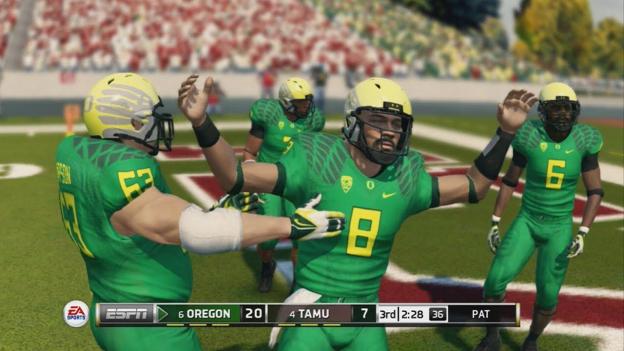 After a long and fruitful relationship that spawned 17 annual games, the NCAA announced that it will not renew its licensing deal with Electronic Arts. The contract expires in June 2014, but according to the nature of the contract, the NCAA was required to give notice now so EA Sports could plan for the future accordingly. For fans of the series, that makes NCAA Football 14 the last game in the franchise – or at least the last game to use that particular name.
After a long and fruitful relationship that spawned 17 annual games, the NCAA announced that it will not renew its licensing deal with Electronic Arts. The contract expires in June 2014, but according to the nature of the contract, the NCAA was required to give notice now so EA Sports could plan for the future accordingly. For fans of the series, that makes NCAA Football 14 the last game in the franchise – or at least the last game to use that particular name.

The decision comes in the wake of the lawsuit that began with former UCLA basketball player Ed O’Bannon, who is suing the NCAA, Electronic Arts, and the Collegiate Licensing Company over the use of his likeness without permission. O’Bannon has been joined by several others, and is awaiting a judgment that will grant it class action status.
O’Bannon’s case was recently strengthened by the legal victory of former Rutgers quarterback Ryan Hart, who won an appeal against EA that overturns an earlier dismissal, clearing the way for a trial. This stands in contrast to EA’s previous defense that video games, and the use of player likenesses, are protected under the First Amendment. Former Nebraska and Arizona State quarterback Samuel Keller is also involved in an identical appeal, and his case has been combined with O’Bannon’s.
O’Bannon’s lawyers have claimed for months now that they have several current NCAA players ready to join the lawsuit, but are afraid to unless they receive assurances that they could do so without reprisals from the NCAA. The NCAA has said that it would not target student-athletes that came forward, but it also wouldn’t give them any written guarantees.
The NCAA’s decision to not renew the contract presents an interesting legal situation. O’Bannon’s lawsuit was not specifically regarding video games, while Keller’s was. That makes an already complicated lawsuit even more of a quagmire. It does, however, protect the NCAA from any current or future players looking to bring suit against EA.
“The NCAA has never licensed the use of current student-athlete names, images or likenesses to EA,” the statement read. “The NCAA has no involvement in licenses between EA and former student-athletes.”
To further complicate things for EA, the NCAA lawsuits are joined by others revolving around the Madden franchise, including a class action suit from former NFL players, also over the use of their likenesses.

“Member colleges and universities license their own trademarks and other intellectual property for the video game,” the NCAA stated. “They will have to independently decide whether to continue those business arrangements in the future.”
Judging from the response from EA Sports, doesn’t see that as a huge problem.
“This is simple: EA SPORTS will continue to develop and publish college football games, but we will no longer include the NCAA names and marks,” Andrew Wilson, Executive Vice President for EA Sports responded in a statement. “Our relationship with the Collegiate Licensing Company is strong and we are already working on a new game for next generation consoles which will launch next year and feature the college teams, conferences and all the innovation fans expect from EA SPORTS.”
[UPDATE] Following the news of the split, EA quickly confirmed that it has signed a new, 3-year contract extension with the Collegiate Licensing Company, the body that controls the licensing and marketing rights to 200 colleges, conferences, and Bowl games. It is now up to the individual groups to decide whether or not they will allow EA Sports to feature them in the games. So far more than 150 schools have agreed to the contract extension, but a few (who have not been named) have opted out.


